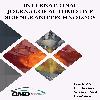Experimental Investigation of Frictional Power Apportionment of Moving Parts in a Hydrogen Fueled Multi-Cylinder Spark Ignition Engine
This study deals with the frictional power of each moving part in hydrogen fueled multi-cylinder spark ignition engine. The moving parts such as piston, rings, bearings, cam, and roller follower are considered for this study. The engine was run at a constant speed of 1500 rpm with different loads. The indicated power of the engine is calculated using the in-cylinder pressure data, and the brake power is measured with respect to different loads. The frictional power of each moving component is calcu-lated using the models available in the literature. The constants of the models are calibrated for the engine with the input of the measured experimental data. The frictional power of the components increases with an increase in the engine’s load. The friction between the piston and the ring with the liner is the highest among other components’ friction due to mainly gas pressure (in the piston rings) acting on the piston being the highest. The percentages of frictional power of each moving component at the power output of 15.1 kW are 30.8% (friction in piston rings due to gas pressure), 18.4% (piston skirt), 13.4 % (bearings), 8.5 % (cam), 6.9 % (piston ring tension) at applied engine load of 15.1 kW. This study results could be useful to find avenues for reducing the friction of the moving parts to enhance the fuel economy and endurance life of the engines.
Keywords:
Friction, Hydrogen, Load Lubricating oil, Speed,
___
- [1] Dhyani V, Subramanian KA. Experimental based comparative exergy analysis of a multi-cylinder spark ignition engine fuelled with different gaseous (CNG, HCNG, and hydrogen) fuels. Int J Hydrogen Energy 2019; 44:20440–51.
- [2] Duleep KG. Internal Combustion Engine Vehicles. Encycl Energy 2004; 3:497–513.
- [3] Da Silveira MA, Gertz LC, Cervieri A, Rodrigues AFA, Senger M. Analysis of the friction losses in an internal com-bustion engine. SAE Tech Pap 2012.
- [4] Kouremenos DA, Rakopoulos CD, Hountalas DT, Zannis TK. Development of a detailed friction model to predict mechanical losses at elevated maximum combustion pressures. SAE Tech Pap 2001.
- Yayın Aralığı: Yılda 4 Sayı
- Başlangıç: 2016
- Yayıncı: Otomotiv Mühendisleri Derneği
Sayıdaki Diğer Makaleler
Hüseyin Bayrakçeken, Hicri Yavuz
Akshey Marwaha, K.A. Subramanian
Shreemohan SİNHA, Anilkumar Shere, K A Subramanian
Naba Kumar Mondal, Soumya Kundu, Kamalesh Sen
K. A. Subramanian, Sachin Kumar Gupta
K. A. Subramanian, Nidhi Chaudhary
K. A. Subramanian, Nidhi Chaudhary
Seyfi Şevik, Özgür Özdilli, Furkan Akbulut
Hakan Serhad Soyhan, Mehrez Gassoumi, Fakher Hamdi, Zouhaier Bouta, Ridha Ennetta
